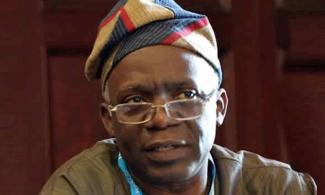
Human rights lawyer, Mr Femi Falana (SAN) has said Nigeria has lamented that Nigeria has the “highest number of pre-election cases in the world and the highest number of election petitions”.
The Senior Advocate of Nigeria added that the issue should be a matter of concern to “forces of democracy”.
Falana disclosed this while commenting on the 2023 general elections including the presidential poll won by Bola Tinubu of the All Progressives Congress.
Four presidential candidates had approached the Presidential Election Petitions Tribunal in Abuja with separate petitions, seeking the nullification of the declaration of Tinubu as the winner of the February 25 presidential poll.
Falana said Nigeria has had cases of this nature before which did not go in favour of the petitioners.
The petitioners, seeking the nullification of Tinubu’s emergence as ‘President-elect’ are Atiku Abubakar of the Peoples Democratic Party; Peter Obi of the Labour Party; Solomon Okangbuan of the Action Alliance and Chichi Ojei of the Allied People’s Movement.
Atiku came second with 6,984,520 votes; while Obi came third with 6,101,533 votes.
The petition by Obi and LP, marked CA/PEPC/03/2023, had INEC, Tinubu, his running mate, Shettima Kashim, and the APC as respondents.
In the petition, Obi further contended that Tinubu “was not duly elected by majority of the lawful votes cast at the time of the election.”
Obi claimed there was rigging in 11 states, adding that he would demonstrate this in the declaration of results based on the uploaded results.
In response, Falana said a lot will depend on the evidence produced by the petitioners.
He said, "A lot depends on the evidence produced by the petitioners but I am not in any way pessimistic having regards to our history with regards to the election petition, I can tell you that for me, it is extremely disturbing and I have made the point repeatedly. We cannot continue to involve the judiciary in the elections of the representative of our people. We must put that lay to rest.
“We have thought that with enough reform of the electoral system, by now we should be taking the court out of the electoral system. I am disturbed as a lawyer that Nigerians are now saying the election has been moved to the court. That is not very complimentary.
“But as I did say elsewhere, Nigeria has the highest number of pre-election cases in the world and the highest number of election petitions. It should be a matter of concern to all genuine forces of democracy.”
Falana added, "We have had cases of this nature before...but yes! (it has not been in favour of the person who made the application against the result) but again, I go back to the 2007 presidential election."
According to him, the 2007 judgment was split with four against three justices of the Supreme Court so it was a judgement which could have gone either way.
"So, as I said earlier, it depends on the evidence produced. A couple of African countries, their presidential elections have been annulled by the court, and in Nigeria, a number of election petitions in the state have succeeded in which the sitting governor has been removed. So, there shouldn't be any course for alarm," he said.
Mr Falana also faulted the non-implementation of the recommendations forwarded by the Justice Uwais Electoral Reform Panel by governments that succeeded the late President Umaru Yar’Adua on the systematic failure that characterised electoral petitions.
He continued: “I am not a stakeholder but whereas the Yar’Adua government set up the Justice Uwais Electoral Reform Panel to look at this problem because the winner of the election did say publicly that the election that produced me was highly flawed and therefore, I am going to put an end to this ugly development.
“And the panel came up with profound recommendations on total independence of the INEC, conclusion of the election petition before the inauguration of a new government, the setting up of an electoral offences commission to deal with electoral offences and malfeasances so that Attorney-General will not terminate those cases by filing application for nolle prosequi.
“But what has happened is that successive governments have just ignored those fundamental recommendations. That is why we are where we are.”